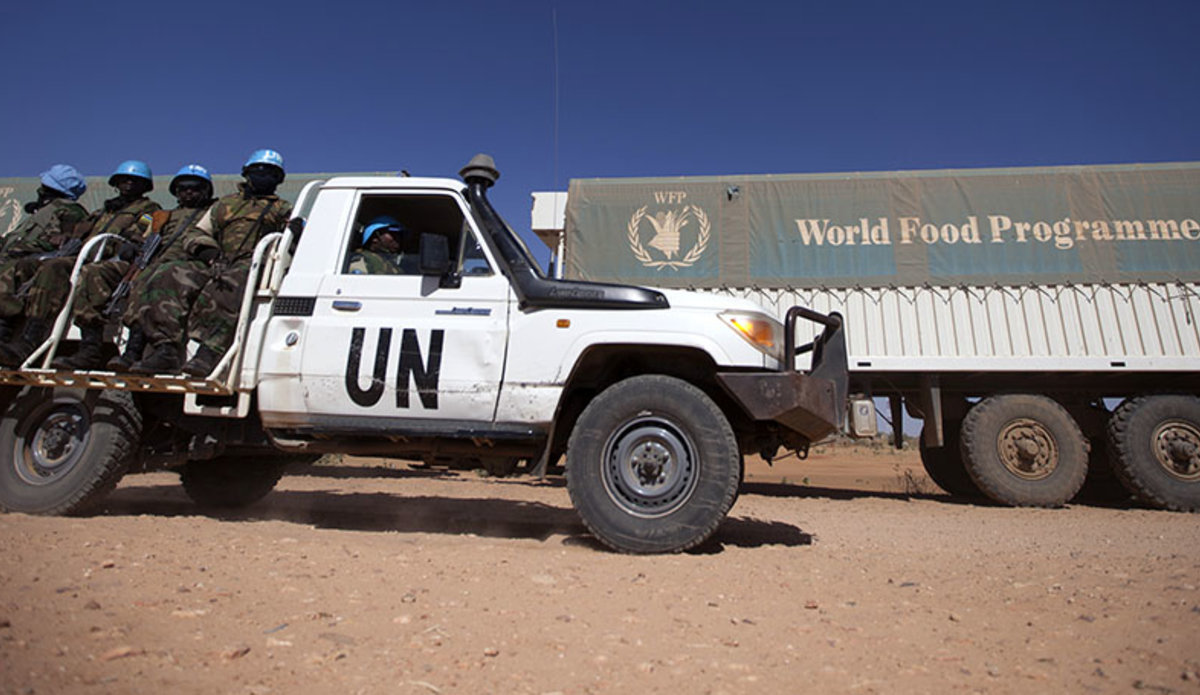UNAMID Continues to Assist Humanitarian Actors in Darfur
The decade-long conflict in Darfur has resulted in thousands of people being displaced from their homes and villages across the region. Most seek shelter in camps for the internally displaced; these camps lack basic amenities such as food, water, shelter and access to proper sanitation as well as healthcare. Humanitarian aid, thus, becomes a crucial need for the displaced populations.
By Sharon Lukunka
One of the core mandates of the African-Union-United Nations Mission in Darfur (UNAMID) is facilitating the access of humanitarian aid and protecting humanitarian workers. UNAMID’s military component provides escorts to humanitarian actors, including the UN Country Team, in all five states of Darfur. The nature of such escorts is dictated by the security situation on the ground. Escorts are usually led by a protection-based element which typically consists of armoured or soft-skinned vehicles. These are followed by other elements of the convoy.
Each week, UNAMID, in collaboration with UN agencies and other relevant stakeholders, plan upcoming convoys to deliver assistance to vulnerable populations in remote areas. This has taken on even more significance following the increased clashes in different parts of the region, as well as the reported movements of armed groups.
“Commercial trucks, at times, prefer to travel on their own but due to the increasing insecurity, UN agencies request UNAMID for armed escorts,” said Mr. Abdirahman Meygag, Coordinator and Head of Area Office North Darfur, World Food Programme (WFP). WFP regularly distributes food supplies to some 3 million internally displaced persons (IDPs) and others affected by the unstable conditions in Darfur. UNAMID plays a valuable role in helping WFP achieve its humanitarian goals by providing escorts to vehicles carrying food and non-food items from the main WFP warehouse to sector warehouses and from sector warehouses to distribution points.
Mr. Meygag revealed that apart from food delivery to displaced populations, WFP also conducts an emergency operation covering the whole of North Darfur providing food assistance to more than 1 million recipients every month, including IDPs, feeding programmes for school children, nutritional support for mothers and providing livelihood support in rural areas. This benefits some 326,000 IDPs who receive monthly cash vouchers (value equivalent to in-kind food), in areas where there is access to local markets, creating diversified options on food intake and improving livelihoods. UNAMID convoys assist WFP by ensuring secure movement of its personnel and trucks.
While aid agencies in Darfur consistently attempt to reach those most in need, many are unable to receive any humanitarian assistance as insecurity continues to hamper the efforts of aid workers. The deteriorating security situation has also clearly affected and many humanitarian actors are unable to retain their staff on the ground. Some have had their field offices looted and suffer from delays in the issuance of required permits. Government restrictions on movements of humanitarian agencies have also affected operations in the area.
Additionally, attacks on convoys and warehouses continue to disrupt work flows. A recent report from the Office for the Coordination and Humanitarian Affairs (OCHA) states that road insecurity remains a major problem affecting the movement of humanitarian staff and supplies in areas such as Central Darfur.
Despite these challenges, the Mission is committed to ensuring the safety and security of humanitarian personnel and remains steadfast in achieving its mandate. “The Mission does whatever lies within its capability to protect civilians and support the humanitarian community in meeting the needs of the people of Darfur. We work in partnership with humanitarian agencies to support vulnerable populations and provide them with essential services,” said Mr. Oriano Micaletti, Officer-in-Charge of UNAMID’s Protection of Civilians Section.
19 August is World Humanitarian Day, an annual occasion to honour the thousands of people who risk their lives every day to get humanitarian aid to people in need in Sudan and around the world.
 UN
UN United Nations Peacekeeping
United Nations Peacekeeping

